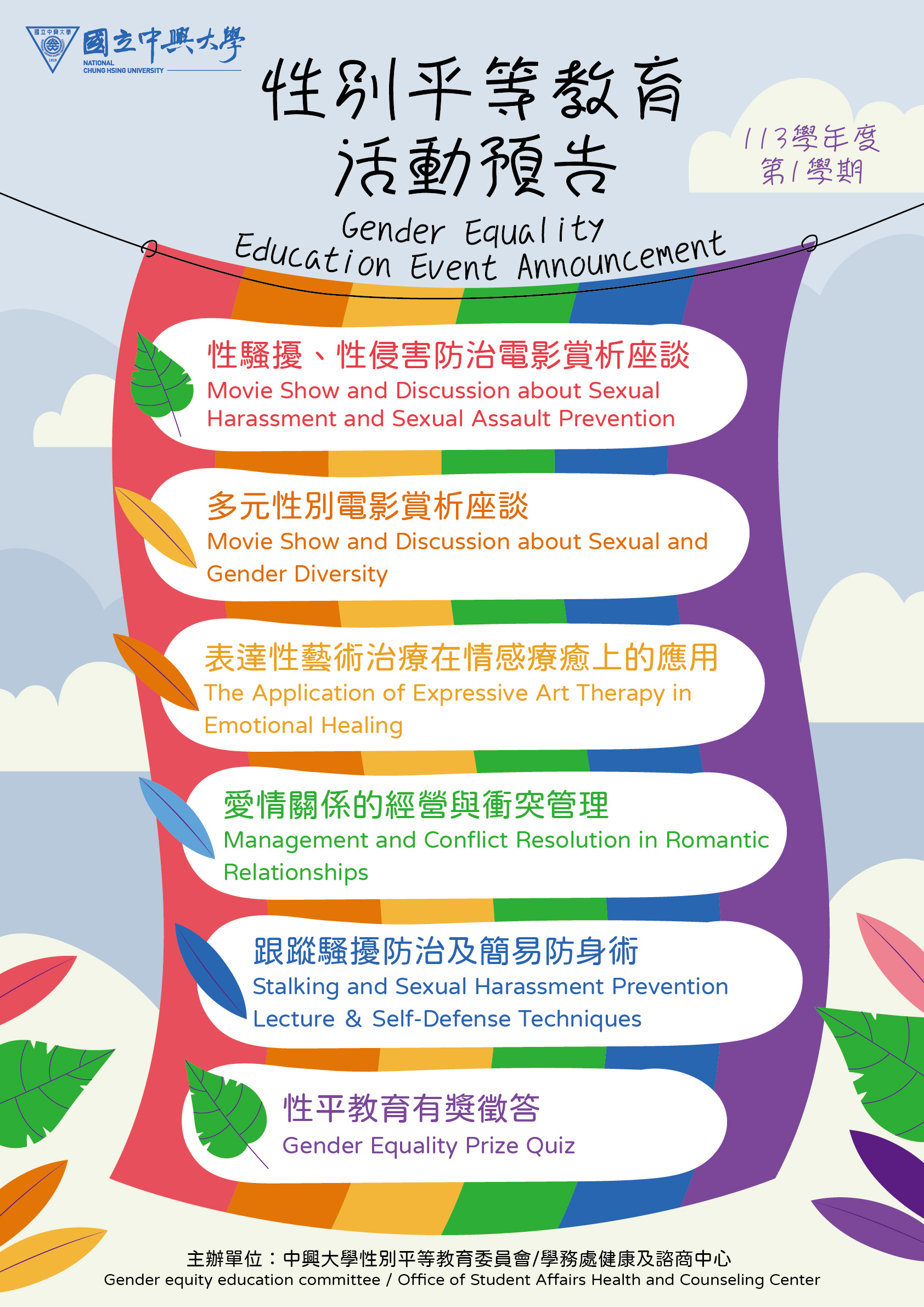
教育宣導Promotion
性別平等教育活動 Gender Equity Education Activities

校園性別事件 Campus Gender Incidents
什麼是性騷擾? What is Sexual Harassment?
依據性別平等教育法(簡稱性平法)的定義,性騷擾是指以明示或暗示之方式,從事不受歡迎且具有性意味或性別歧視之言詞或行為,致影響他人之人格尊嚴、學習、或工作之機會或表現者。或以性或性別有關之行為,作為自己或他人獲得、喪失或減損其學習或工作有關權益之條件者。
According to the definition in the Gender Equity Education Act (abbreviated as the Gender Equity Act), sexual harassment refers to undesirable conduct of a sexual nature or conduct involving gender discrimination through verbal, physical, or other means, which impacts a person's dignity, learning, or work opportunities or performance. It also includes situations where submission to such conduct becomes a condition for obtaining, losing, or reducing education or work-related benefits for oneself or others.
什麼是性霸凌? What is Sexual Bullying?
依據性平法的定義,性霸凌是指透過語言、肢體或其他暴力,對於他人之性別特徵、性別特質、性傾向或性別認同進行貶抑、攻擊或威脅之行為且非屬性騷擾者。
According to the Gender Equity Act, sexual bullying refers to conduct involving language, physical acts, or other violent behavior that belittles, attacks, or threatens a person's gender characteristics, gender traits, sexual orientation, or gender identity, excluding behaviors that constitute sexual harassment.
什麼是性侵害? What is Sexual Assault?
指性侵害犯罪防治法所稱性侵害犯罪之行為。
It refers to the acts of sexual assault crimes as defined in the Sexual Assault Crime Prevention Act.
性別平等教育法(性平法)適用對象 Applicability of the Gender Equity Education Act
指性別事件涉及的一方為校長、教職員工或學生,而另一方為學生。也就是說,凡是在校園中發生的、涉及學生的性騷擾事件,都是校內的性別平等教育委員會受理的範圍。
The act applies when one party in a gender-related incident is the president, faculty, staff, or a student, and the other party is a student. In other words, the university's Gender Equity Education Committee has jurisdiction over incidents of sexual harassment involving students that occur on campus.
如果被性騷擾/性霸凌要怎麼辦? What should I do if I experience sexual harassment/bullying?
如果你被性騷擾/性霸凌… If you are sexually harassed/bullied...
面對性騷擾/性霸凌時,首先要確定自己的感覺,不論對方是善意、無意還是惡意的騷擾,只要妳/你讓對方知道妳/你覺得不舒服,對方就應該尊重妳/你的感受。當然,妳/你可以判斷狀況,視情況選擇是要勇敢大聲地説「不」,或是婉轉告知對方;是要直接做出反抗,或是請求旁人協助。
When facing sexual harassment/bullying, first confirm your own feelings. Regardless of whether the perpetrator's intent was good, bad, or unintentional, if you let them know you feel uncomfortable, they should respect your feelings. Of course, you can assess the situation and choose whether to boldly say "no" out loud or express it in a more indirect manner; whether to directly resist or seek assistance from others.
萬一騷擾的言語或行為還是繼續在發生,你可以選擇這樣做: If the harassing language or behavior continues, you can choose to do the following:
- 告訴自己信任的人,尋求心理上的支持與其他支援。Tell someone you trust and seek emotional support and other assistance.
- 盡可能詳細地記錄事情發生的經過,以助於未來提出申訴証據之用。Record the details of the incident as accurately as possible to aid in providing evidence for future complaints.
- 向學校提出申訴,學校會透過「性別平等教育委員會」,負責處理校園性騷擾問題,並提供給受害人必要的協助。File a complaint with the school. The school will handle campus sexual harassment issues through the "Gender Equity Education Committee" and provide necessary assistance to the victim.
如果週遭的人遇到性騷擾/性霸凌… If someone around you experiences sexual harassment/bullying...
當周遭有人遭受性騷擾/性霸凌,這時候最重要的是不要成為情境中的共犯。例如當有人針對在場者的身體特徵開黃腔,因而讓當事人不舒服時,我們不應該為了怕「破壞氣氛」而跟著起閧,甚至可以出面制止騷擾者的言語及行為。最重要的是不要落入「責怪受害者」的迷思中,質疑受害者的特質與行為,或是懐疑受害者的認定標準,畢竟每個人都有不同的身體界線與感覺,我們應該給予信任與支持。
When someone around you is sexually harassed/bullied, the most important thing is not to become an accomplice. For example, if someone makes offensive remarks about a person's body features, making that person uncomfortable, we should not join in to avoid "ruining the atmosphere" and can intervene to stop the harasser's words and actions. Most importantly, do not fall into the myth of "blaming the victim" by questioning the victim's qualities and behavior or doubting the standards for determining victimization. Everyone has different physical boundaries and feelings, and we should give trust and support.
萬一身邊的人被性騷擾/性霸凌所困擾並向你求助,你可以: If someone around you is troubled by sexual harassment/bullying and seeks your help, you can:
- 做一個聆聽者,給予他/她支持與瞭解,必要時幫忙他/她一起制止騷擾者的行為。Be a listener and provide support and understanding. If necessary, help stop the harasser's behavior together.
- 提供他/她求助的資源與管道,例如學校的學安室、健康及諮商中心、信任的師長或社區的諮商中心等。Provide resources and channels for seeking help, such as the school's Student Safety Division, Health and Counseling Center, trusted faculty or staff, or community counseling centers.
- 如果可以,請離開現場,就近找行政辦公室的教職員工協助。If possible, leave the scene and seek help from faculty or staff at a nearby administrative office.
- 觀察現場環境,若屬於安全範圍,可以直接告知對方自己感受到騷擾,而這種騷擾讓人不舒服,請對方立即停止繼續該行為。Observe the environment. If it is safe, you can directly inform the person that you feel harassed by their behavior, which makes you uncomfortable, and request them to stop immediately.
- 依據現場環境,打電話請求同學、朋友或家人協助,若為陌生環境,可嘗試向身邊的人求救。Depending on the environment, call a classmate, friend or family member for assistance. If in an unfamiliar environment, try seeking help from people around you.
- 打電話報警。可下載警政署110視訊報案APP系統,該系統具有立即定位報案人位置、錄音與錄影及撥放警語等功能,使用本項報案系統,若行動電話網路連線受到影響,可撥打110報案電話,轄區警察就會前往現場協助處理。Call the police. You can download the Police 110 Video Report App which can immediately locate your position, record audio/video, and broadcast a police warning. Using this reporting system, if the mobile network is affected, you can call 110 to have police officers dispatched to the scene to assist.

- 先安撫當事人情緒,再視當事人意願轉介至學生事務處健康及諮商中心,請諮商輔導人員或社工師協助處理。First, comfort the student and then, based on their willingness, refer them to the Health and Counseling Center of the Office of Student Affairs for assistance from counselors or social workers.
- 如有報警或驗傷之需求,可請學生事務處學生安全輔導室的校安人員協助。If there is a need to call the police or seek medical treatment, the campus security staff from the Student Safety Division can provide assistance.
- 視當事人意願,陪同至性別平等教育委員會業務窗口(惠蓀堂2樓學生安全輔導室)提出校園性別事件申訴申請。Based on the student's willingness, accompany them to the service counter of the Gender Equity Education Committee (3rd floor of the Administration Hall, Office of Student Affairs) to file a campus gender incident complaint.
- 如當事人有就學之困難(避開疑似行為人),請系所單位及導師或授課教師提供當事人協助(彈性調整出席方式、繳交作業、報告等)。If the student faces difficulties with studies (avoiding the alleged perpetrator), the department/institute, advisor, or instructor should provide assistance (flexible attendance, assignment submission, reports, etc.).
- 避免私下找雙方當事人詢問,以免造成被害人二度傷害。Avoid privately questioning both parties to prevent secondary harm to the victim.
- 依通報規定,於知悉事件後24小時內完成校內通報及通報登錄作業。(向學務處通報,由學務處學安室完成校安系統通報登錄作業)According to reporting regulations, complete internal reporting and logging within 24 hours of becoming aware of the incident. (Report to the Office of Student Affairs, which will handle reporting and logging in the campus security system through the Student Safety Division.)
校園性別事件:指事件之一方為學校的教職員工學生,他方為學生,並有下列情形之一者,恐涉及校園性別事件範圍。
Campus gender incidents refer to situations where one party is a faculty, staff, or student of the school, and the other party is a student, with any of the following circumstances potentially constituting a campus gender incident.
| 項次 Item No. |
行為態樣 Behavior Pattern |
行為類別 Behavior Category |
可能涉法類別 Potential Legal Category Involved |
|---|---|---|---|
| 1 | ◎尾隨當事人。
Following/stalking the person. ◎打聽、探查當事人行蹤,並於行經路徑、教室外、廁所等候,致當事人有不舒服或恐懼之感。 Inquiring about and investigating the person's whereabouts, and waiting along their routes, outside classrooms, bathrooms, etc., causing the person to feel uncomfortable or fearful. ◎阻擋當事人離開、強行攔堵或強行送禮。 Blocking the person from leaving, forcibly obstructing, or forcibly giving gifts. |
跟蹤騷擾
Stalking Harassment 不當追求 Inappropriate Pursuit |
性騷擾
Sexual Harassment 跟蹤騷擾 Stalking Harassment |
| 2 | ◎於浴廁內進行偷窺或偷拍之行為。
Peeking or taking photos/videos in bathrooms without consent. ◎未徵求當事人同意,逕自拍攝當事人之腰部、腿部或裙底。 Taking photos/videos of a person's waist, legs, or under their skirt without consent. |
偷窺
Voyeurism 偷拍 Illegal Filming/Photography |
性騷擾
Sexual Harassment |
| 3 | ◎隨意評論他人外觀及穿著,並以告誡語氣說不應有此放蕩行為、勾引他人之語。
Commenting on others' appearances and dress, and using a warning tone to say that such promiscuous behavior or seducing others is inappropriate. ◎嘲笑他人外表、個性、舉止,或隨意評論他人的性別取向。 Mocking others' appearances, personalities, mannerisms, or casually commenting on their sexual orientation. |
性別歧視
Gender Discrimination |
性騷擾
Sexual Harassment |
| 4 | ◎對他人開黃腔、說一些帶有影射性的又與性或性別相關的用語。
Making lewd jokes or using suggestive language related to sex or gender towards others. ◎任意拍肩、摟肩、觸碰他人身體等不尊重他人之言行舉止。(提醒:即使是好朋友也可能會冒犯喔!!!) Randomly touching others' shoulders, hugging, or touching their bodies without respect (Reminder: This can offend even good friends!) |
性別歧視
Gender Discrimination 不當碰觸 Inappropriate Physical Contact |
性騷擾
Sexual Harassment |
| 5 | ◎違反當事人意願之性行為。
Engaging in sexual acts against the person's will. ◎強抱或觸碰當事人身體隱私部位,屬強制猥褻之行為。 Forcibly hugging or touching the private parts of a person's body, which constitutes forced obscenity. |
違反性自主權
Violation of Sexual Autonomy 從事與性或性別有關之不受歡迎行為 Engaging in Unwelcome Conduct Related to Sex or Gender |
性侵害(妨害性自主)
Sexual Assault (Infringement of Sexual Autonomy) |
註:樣態類別僅供參考。
Note: The behavior categories are for reference only.